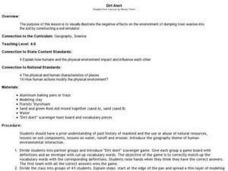Curated OER
Indiana Ice Investigations
Fourth graders create a model of the formation of Indiana by glaciers. Working in groups with appropriate materials, they create a model documenting how glaciers moved through the land and formed the geological structure and land masses...
Curated OER
Rock and Roll!
Students predict what happen to the rocks. They observe, describe, and record changes in rocks. They apply their learning by describing the forces that break down and wear away rocks.
Kenan Fellows
Sustainability: Learning for a Lifetime – Soil
Do great gardeners really have green thumbs—or just really great soil? Environmental scholars discover what makes Earth's soil and soil quality so important through research and experimentation. Learners also develop an understanding of...
Curated OER
Seed to Soup Organic Garden
Have your young biologists visit decomposition stations as they explore the process of organic material. This activity involves some set-up as kids will be visiting 13 desks to collect colored paper each representing a different element...
Curated OER
Renewable vs. Non-Renewable Resources
Here's a fine lesson on renewable and non-renewable sources of energy for your 5th graders. In it, learners list a number of natural resources on the board, then try to sort the resources into appropriate categories. This helps them to...
Curated OER
Stanley Park and Aquarium Field Trip
Learners explore the beauty of British Columbia by participating in a class field trip. In this ecosystem observation lesson, students investigate the Vancouver Aquarium and Stanley Park, one of the largest parks in North America....
Curated OER
Sentence Parts Worksheet 1
In this grammar learning exercise, students label all the subjects, verbs, direct objects and complements in ten sentences. Students justify their choices.
Curated OER
Processes of the Rock Cycle
Students explore, predict, and create each major rock form (sedimentary, metamorphic, and igneous) with colored modeling clay, discover cycle of rock formation, and examine important relationships of heat and pressure in rock development.
Curated OER
See That Sound?
Students study sonar and will explain the concept of it and its major components. In this design lesson students build a low-cost sonar system.
Curated OER
Renewable vs. Non-Renewable Resources
Fifth graders, after brainstorming why conservation of resources is important, distinguish between renewable and non-renewable resources. They make a list of different types of natural resources on the board and then sort them into two...
Curated OER
A Reef of Your Own
Learners study the reproductive strategies of reef building corals. In this coral reef lesson students describe the behaviors of reef building corals and their nutritional strategies.
Curated OER
Layers of Time in the Earth
Young scholars are introduced to the concept of stratification as a historical and geological process. Students will read about the Richard Beene archaeological site, which lies near San Antonio, Texas on the Medina River, and watch a...
Curated OER
Dirt Alert
Students explore the environment and effects of pollution. They participate in a "Dirt Alert" scavenger game to study vocabulary words. Students construct a soil simulator to visually illustrate the negative effects on the environment of...
Curated OER
Red River of the North Flooding 1997
Students describe factors that affect the flow of rivers and explain their relationships. They research the factors involved in flooding events. describe the effects of present and future practices in land use, and river control methods.















